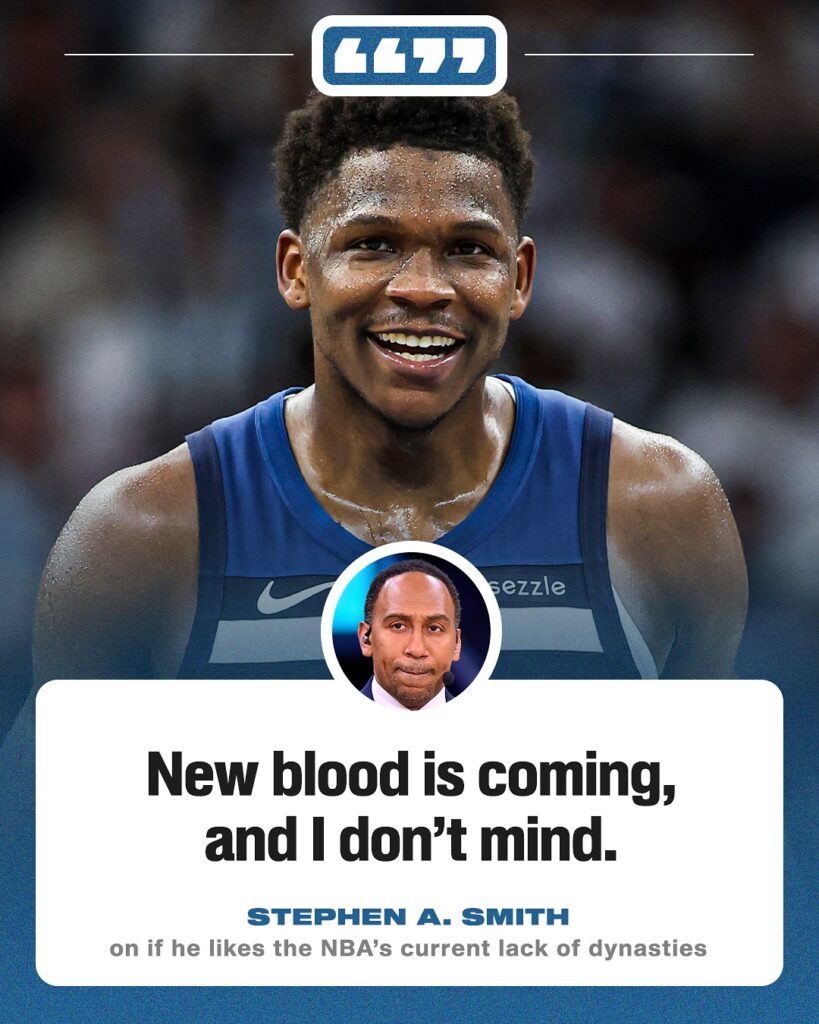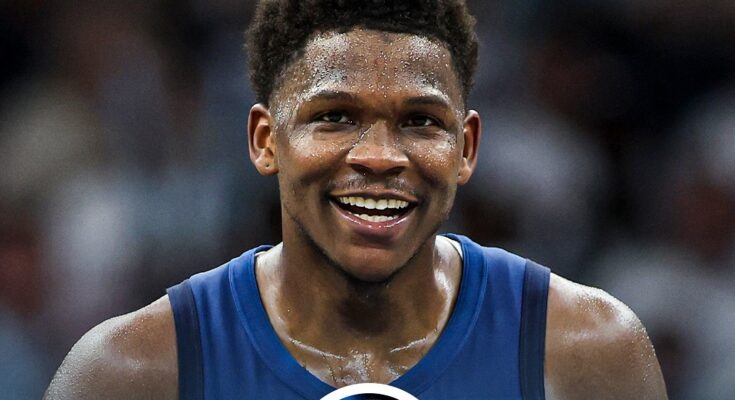
For nearly two decades, the NBA has been defined by its dynasties. From the Shaq-and-Kobe Lakers to the Tim Duncan-era Spurs, from the Big Three in Miami to the Golden State Warriors’ reign, dynastic runs created stability, rivalries, and familiar storylines. But in recent seasons, the NBA has shifted dramatically. There’s parity now—uncertainty, balance, and a sense that any team could rise to the top.
Surprisingly—or perhaps not, if you’ve followed his evolution as a commentator—Stephen A. Smith is just fine with it. In fact, the outspoken ESPN analyst has gone on record saying he doesn’t mind the absence of dynasties at all.
“People keep asking me if the league’s missing dynasties. I’m like—have y’all been watching? This is some of the best basketball we’ve ever seen,” Smith said recently on First Take. “There’s more competition, more drama, and more unpredictability. I’m not mad at that.”
Let’s break down why Stephen A. is embracing the league’s new era—and why, frankly, he might be onto something.
The Parity Era Is Here
In the past five seasons alone, we’ve seen five different champions:
- 2019 – Toronto Raptors
- 2020 – Los Angeles Lakers
- 2021 – Milwaukee Bucks
- 2022 – Golden State Warriors
- 2023 – Denver Nuggets
None of these teams have repeated. Some, like the Raptors, had a one-year window before significant roster changes. Others, like the Bucks and Nuggets, are still in the hunt, but the league around them has leveled up.
Stephen A. acknowledges that while dynasties provide long-term storylines and strong viewership, the current state of the league has created something just as valuable: fresh blood, new narratives, and exciting basketball every night.
“There’s no team walking into the building with guaranteed wins anymore,” Smith said. “You’ve got to show up. Every night.”
New Stars, New Rivalries
One of the most compelling aspects of this parity-driven league is the emergence of new superstars—not just talented players, but faces of the league. Stephen A. has consistently praised this new generation.
- Shai Gilgeous-Alexander has turned the Oklahoma City Thunder into contenders.
- Anthony Edwards is becoming a household name and a two-way force for Minnesota.
- Jayson Tatum and Jaylen Brown continue to elevate Boston.
- Luka Dončić and Devin Booker remain appointment viewing every time they hit the court.
“These young brothers are hooping,” Smith said. “We don’t need dynasties to tell us the league’s in good hands.”
Even the older stars like LeBron James, Kevin Durant, and Stephen Curry are still relevant, creating a compelling generational bridge. This mixture of rising talent and seasoned legends adds layers to the drama and makes every postseason more unpredictable.
Every Game Counts
One underrated benefit of a non-dynastic league is that regular season games now feel more meaningful. In past years, when the Warriors were steamrolling teams en route to a 73–9 season or when the LeBron-led Heat coasted to 60-win seasons, there was a sense of inevitability. The regular season felt like a formality.
Not anymore.
Now, matchups between playoff-caliber teams—especially interconference ones—are critical, with seeding often decided by just a couple of wins. That urgency spills into every game, and fans can feel it. Viewership is reflecting that shift too, with younger fanbases rallying around their up-and-coming squads.
Stephen A. highlighted that, saying, “Look at OKC, Sacramento, Minnesota—these aren’t just young teams, they’re real fan bases showing up, repping their city, bringing energy. That’s good for the game.”
The End of “Superteam” Culture?
For much of the 2010s, the league was dominated by the concept of superteams—groups of 3 or more All-Star-level players joining forces to chase titles. LeBron, Wade, and Bosh in Miami. Durant, Curry, Thompson, and Green in Golden State. Even the Brooklyn experiment with Durant, Harden, and Kyrie Irving tried to follow that formula.
But now, teams are succeeding by building more organically, and Stephen A. is here for it.
“There was a time when everybody wanted to jump ship and form a superteam. I get it—it’s about winning. But there’s something satisfying about watching a team grow, suffer, build, and finally break through,” Smith explained. “That’s what Denver did. That’s what Milwaukee did. That’s what OKC might be doing now.”
In Smith’s view, the league is becoming less about “power moves” and more about development, chemistry, and smart front-office work.
Critics of Parity Still Exist
Of course, not everyone is thrilled about the end of dynasties. Some longtime fans miss the consistency of watching a dominant team run the table year after year. There’s comfort in familiarity, and dynasties help create villain/hero dynamics that casual fans can easily follow.
But Smith pushes back on the idea that dynasties are required for the league to thrive.
“You wanna talk dynasties? That’s cool. But if you need the same teams winning every year to stay interested, you’re missing the point,” he argued. “Basketball is about storylines, yes—but it’s also about growth, heartbreak, resilience. That’s what we’re seeing now, more than ever.”
The Future Is Unwritten
Looking ahead, it’s hard to say if another dynasty is on the horizon. Maybe the Celtics break through and start a new era. Maybe Denver wins again and builds a mini-run. Or perhaps someone unexpected—like the Timberwolves or the Thunder—will become the next powerhouse.
But for now, the beauty of the NBA lies in its unpredictability.
Every season begins with hope. Every game feels consequential. And in Stephen A. Smith’s eyes, that’s the essence of sport.
Final Thoughts
Stephen A. Smith has always been one of the NBA’s loudest and most passionate voices. But behind the volume is a real understanding of what makes the game great. While others pine for the days of predictable Finals matchups and multi-ring dynasties, Smith is celebrating the now—the grind, the drama, and the chaos of a league where nothing is guaranteed and any team can become a champion.
And honestly? He’s got a point.
So if you’re still waiting for the next dynasty, you might want to shift your focus. Because according to Stephen A., we’re already in the middle of something just as special.
“The league isn’t lacking dynasties—it’s full of dreams coming true.” ✍️



